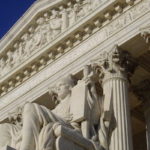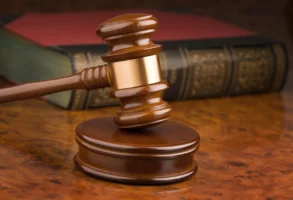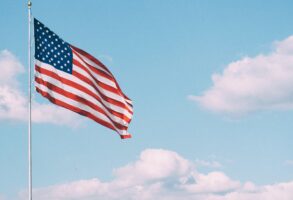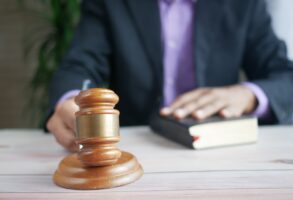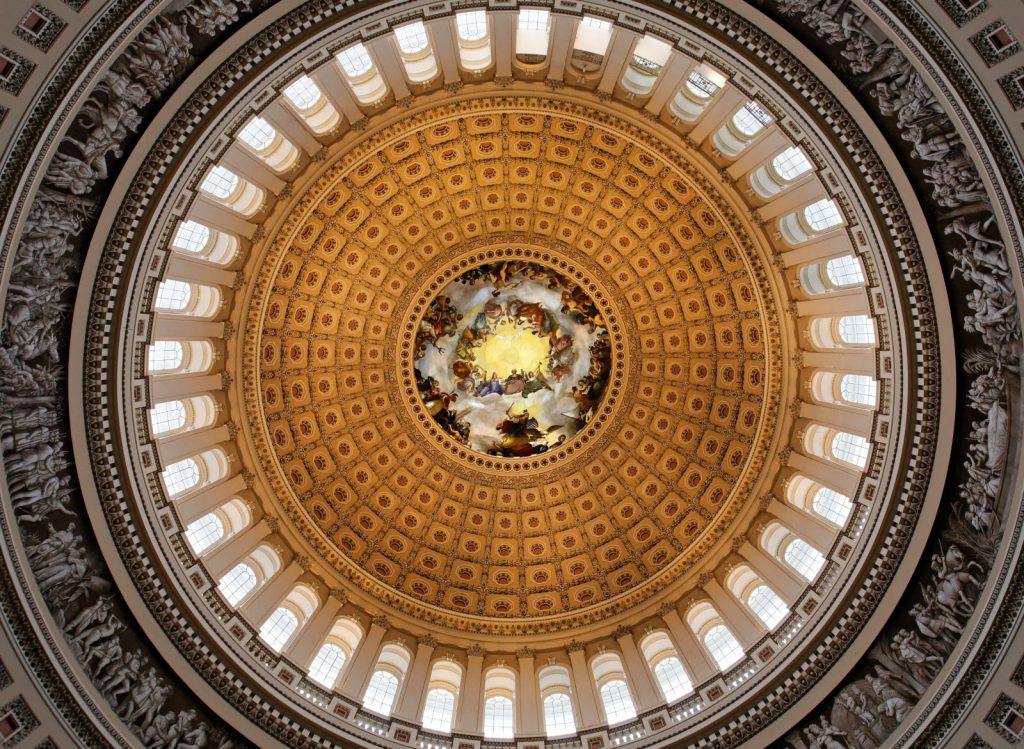
Published April 5, 2017
Simple Justice: A Criminal Defense Blog
David Meyer-Lindenberg crosses Ed Whelan, President of the Ethic and Public Policy Center and a leading conservative voice on Supreme Court nominees.
Q. You were born and raised in Whittier, CA, where you grew up listening to Dodgers games on the radio. After you graduated high school in 1978, you departed for bucolic Cambridge, MA, where you graduated with honors and joined Phi Beta Kappa. Where were you headed? What was the plan? Was law school already on your radar, or did that come later, a momentary lapse of judgment? Is legendary Dodgers announcer Vin Scully to blame for all the baseball references in your work?
A. My earliest memories of baseball coincide with my earliest memories of politics. In part that’s because my home town of Whittier was also the home town of Richard Nixon, who was running for president (again) in 1968, the year in which I was turning eight and beginning to follow Dodgers games on radio. As it happens, my father was then a partner in a small Whittier law firm that Nixon had been a partner in some two to three decades earlier, before he was elected to Congress. So there was a lot of interest in our family and in Whittier in the presidential election.
I went to bed one evening in early June listening on my transistor radio to Don Drysdale extend his scoreless-inning streak, and I awakened the next morning to my mother telling me that Bobby Kennedy had been shot. The first words out of my mouth were, “Did Humphrey do it?” So I suppose that I’ve always had an innate distrust of politicians. Only years later did I learn that Drysdale and Kennedy were good friends and that Drysdale had gone to the Ambassador Hotel right after the game to join in the celebration of Kennedy’s victory in the California primary.
My first visit to Washington, D.C., was in January 1969, when my parents somehow had the courage to take all five of us kids, ages five to eleven, to Nixon’s inauguration (the only presidential inauguration I’ve ever attended). The one memory that particularly stands out is meeting the real Colonel Sanders in the gift store of our hotel.
Much of my youth was indeed spent listening to the golden voice of Vin Scully. When I was courting my wife, I volunteered that no matter how long we lived, the human voice I would recognize before that of any other person was Vin Scully’s. It turns out that she was impressed rather than offended, primarily because, as a student of architectural history, she was surprised that I was on such familiar terms with Yale architecture professor Vincent Scully.
I had no career plan in mind when I headed to Harvard, and I can’t say that I had any coherent approach to my college education. I had to choose during my first week of college whether to accept “advanced standing”—basically, to start college as a sophomore and to declare a major—and I, bereft of good advice, decided to do so. So I focused immediately on selecting courses that would satisfy the various requirements of the Government Department and of Harvard’s broader (and ill-conceived) general-education program. One of the courses I enjoyed most was Archibald Cox’s course on the Supreme Court and the Constitution. When I failed to discern a path in academia that interested me, law school was an obvious default choice.
Q. You decided to stick around for law school, where you served on the editorial board of the Harvard Law Review. What kind of attorney were you going to be? (Ever consider crimlaw?) Any teachers you remember fondly? Even thirty-five years ago, liberal professors at elite schools outnumbered conservatives at least three to one, and back then, there was no Justice Scalia on the Supreme Court. Forceful, high-profile textualists were in short supply.
Did your legal philosophy develop around this time? Was it the result of your academic environment? If so, how’d that happen? Are you now, or have you ever been, a member of the Federalist Society?
A. I actually took a year off between college and law school, living in Paris, studying international relations, and traveling for months all over Europe, including, in addition to the usual places, two weeks in the Soviet Union over Christmas and hitchhiking treks through Brittany and Ireland.
I can’t say that my career plans were any better formed in law school than they were in college. In fact, during my third year, I went through the entire Foreign Service exam process (but never seriously considered accepting the job offer).
I think that I was at Harvard Law School at a low point in the school’s existence. I was amazed to visit it some twenty years later, under then-dean Elena Kagan (who was a year behind me), and to discover how vibrant it had become. My impression is that most of my classmates found it, as I did, a grim and uninspiring experience.
The quality of teaching was mixed at best. Larry Tribe’s course on constitutional law was excellent in some respects, but Tribe’s interest wasn’t in studying the actual Constitution but in teaching us how to take precedents he liked and leverage them into more expansive rulings. Phillip Areeda was an outstanding teacher, and I was fortunate to have him for both contracts and antitrust.
I recognized that there was a lot of nonsense both at the law school and in judicial opinions, but I didn’t consciously have a legal philosophy. I don’t think that it takes a philosophy to recognize the basic common-sense soundness of originalism and textualism.
The Federalist Society was in its early stages when I was in law school, and I’m sorry to say that I didn’t have the good sense to be involved in it. That changed when I moved to D.C. 25 years ago, and whatever my formal membership status has been, I’ve been very active in the Federalist Society since then, including speaking to lots of law school chapters all over the country.
Q. After you graduated (magna cum laude) in ’85, you clerked for Judge J. Clifford Wallace of the Ninth Circuit. Back then, the Ninth was in a bit of an existential crisis: it was staffed with liberal activist judges and had the dubious distinction of most-reversed circuit in the country, with 27 of 28 rulings that reached SCOTUS in ’84 overturned by the Burger court.
Judge Wallace, who fixed things with the help of new appointees during the Reagan years and went on to head up the circuit, was very different: he believed in judicial restraint, the separation of powers and the supremacy of the text of the law, rather in the Scalia and Gorsuch mold. What was it like to be his clerk, especially at this time when so many of his colleagues were happy to rule according to their political preferences? It’s hard not to see some of his judicial philosophy in your writings. What kind of influence was he on you?
A. Judge Wallace is a great judge and a wonderful mentor, and clerking for him at the outset of my legal career was a real blessing. Yes, he believed very strongly in judicial restraint and was a dedicated textualist.
Judge Wallace cared about getting every case right, whether large or small. He also knew that it was important to decide cases quickly. I recall one death penalty case in which he was in dissent. He was amazed that the author of the majority opinion was taking so long (well over a year after conference, if I recall correctly) to draft and circulate her opinion. Even though he disagreed with her proposed disposition, he couldn’t understand how she could leave on death row for so long a prisoner who she believed didn’t belong there.
By contrast, I recall when he returned from a conference on another case in which he and the other judges agreed that an arrestee was being held in violation of the Bail Reform Act. His instructions to me were to set everything aside and draft the opinion pronto: “A man’s in jail who shouldn’t be,” he said. The panel issued his opinion two days later.
Judge Wallace, now 88, is tireless. He has traveled the world for decades to promote judicial reform in other countries. We clerks thought our load might lighten while he was halfway around the globe, but he somehow kept current on everything.
Alas, though, your question wrongly posits that the Ninth Circuit has improved over the years and that Judge Wallace and the Reagan appointees were able to turn things around. On the contrary, I think that the court has gotten worse and worse.
Q. After your first clerkship, you took a break from public service and took a position with Munger, Tolles & Olson in Los Angeles. How come? What did you do during this time? Good as the money must have been, you realized there was an opportunity to do more. When did you know you wanted to do another clerkship? Did Judge Wallace write you a smashing recommendation? What was your interview with Justice Scalia like?
A. I had been a summer clerk at Munger, Tolles & Olson, and correctly discerned it to be a great place to practice law, with the bonus of a very short partnership track. I started off in the corporate department, but quickly figured out that I didn’t enjoy writing dull prose. So I moved into litigation, which was much better suited to my skills and temperament. I couldn’t have asked for a better portfolio and a better set of mentors.
But while I was on vacation in September 1990, it suddenly hit me with crystal clarity that I didn’t want to spend the rest of my life doing what I was doing. With my characteristic impatience, I then asked myself why I should do it for one second more—and I couldn’t come up with a good answer. So when I got back to the office, I informed my colleagues, to their surprise, that I had decided to leave the firm. Where would I go work? I didn’t know.
I have made three major decisions in my life that were, by conventional standards, foolish but that I’m so glad to have made. Deciding to leave Munger Tolles right on the cusp of an all-but-certain partnership, and with little idea what I would do next, was the first of the three.
The firm generously allowed me to continue working while I explored other job opportunities. I traveled back to D.C. to interview with two offices in the U.S. Department of Justice and one in the White House, but didn’t see any of those working out. I was all set to accept an offer with the U.S. Attorney’s Office in Los Angeles when I received a call in early December from the head of one of the DOJ offices. I wasn’t surprised at all when he began with, “Ed, I’m sorry to say that we’re unable to make you an offer at this time.” But I nearly fell out of my chair when he immediately followed with, “But would you be interested in clerking for Justice Scalia?”
If you had asked me to set aside the constraints of reality and pick my next job, clerking for Justice Scalia would have been at the top of the list. I had interviewed for a Supreme Court clerkship with him in 1986, just after my Wallace clerkship ended and just before his Senate confirmation vote. It never crossed my mind to apply again in 1990, when I was a full five years out of law school, and even if it had, I would have assumed that he had long since completed his hiring for the clerkships beginning in the summer of 1991.
In any event, two weeks later, I interviewed with Justice Scalia and his law clerks, and this time things worked out. I owe many people for my good fortune, Judge Wallace high among them. I never did learn just how my unsuccessful application for a job at DOJ ended up in a Scalia clerkship.
Q. During its October ’91 term, you did what most lawyers only dream of: clerked for SCOTUS, and not just any old Justice, but Justice Antonin Scalia. When the time came to help Scalia with opinion-drafting, what did you get to do? How closely were his clerks involved in hashing out his reasoning? Did you get to see your arguments make it into print?
What was it like to be apprenticed to the legend himself? The ‘91 term was a pretty rough one for textualists and originalists, with SCOTUS indulging its policy preferences in cases like Planned Parenthood v. Casey. How’d Scalia deal with it? What did he leave you with?
A. Justice Scalia was wonderful to work for, for lots of reasons. Most important was the education in rigorous legal thinking and writing that we clerks received by being his sounding board, by working through legal arguments with him, and by seeing him refashion our drafts.
Justice Scalia authorized each of his clerks to publicly acknowledge their contributions to one opinion. Mine was his dissent from the Establishment Clause ruling in Lee v. Weisman. Among the memorable lines in that dissent is that “interior decorating is a rock-hard science compared to psychology practiced by amateurs.”
The October 1991 Term was indeed very rough, and it made evident that Justices O’Connor, Kennedy, and Souter had judicial approaches that had little in common with Justice Scalia’s. Justice Scalia was already aware of that from previous years, but he was surely disappointed to see it play out concretely. I recall asking him, somewhat imprudently, how he could possibly put up with it all, year after year. His simple answer was “Maureen”—his wife, whose love sustained him.
Q. After your clerkship came to an end, you went to work for the Senate Judiciary Committee as a senior staffer for Orrin Hatch (R-Utah). From ’92 to ’95, you advised him on constitutional, regulatory and judicial matters, including SCOTUS nominations. (Notably, you worked on the nominations of Ruth Bader Ginsburg and Stephen Breyer.) Since then, you’ve established yourself as a go-to commenter on SCOTUS picks and sitting judges.
Take Ginsburg. You’ve written about everything from her decidedly left-wing pre-SCOTUS record to her embrace of the “living Constitution” claim to her penchant for commenting on politics, like Trump’s run for President. Back in ’93, your boss, Senator Hatch, likely thought her about as suited to SCOTUS as you do. But when the time came to vote, Hatch, like nearly all Senate Republicans, decided a sitting president’s pick was entitled to a good deal of deference and voted to confirm.
So what changed? Why does today’s Senate minority feel entitled to oppose a Republican’s pick for SCOTUS when there’s universal agreement he’s qualified to serve? At his hearing, Senate Democrats subjected Gorsuch to some intemperate, silly grilling on his personal views. Doesn’t that contrast rather starkly with the Senate’s bipartisan willingness to respect Ginsburg’s “no hints, no forecasts, no previews” rule at her own hearing? What are we to make of this double standard? When Republicans are next in the minority, will they need to respond in kind? Is comity dead?
A. There are two leading contenders for how the Senate should exercise its so-called “advice and consent” power over Supreme Court nominations. Under one model, senators should defer to the president, largely set aside considerations of judicial philosophy, and focus primarily on whether the nominee meets some suitable standard of intellect and character. Under a second model, judicial philosophy should be front and center.
What’s happened in recent decades is that both parties have moved from the first model to the second, even if they’ve sometimes tried to camouflage that move. Senate Democrats made that shift no later than 1987, when they defeated President Reagan’s nomination of Robert Bork. Senate Republicans continued with the deference model on the Ginsburg and Breyer nominations in 1993 and 1994, but moved to the second model 16 years later, on President Obama’s nominations of Sonia Sotomayor and Elena Kagan.
Why the shift? The simple answer, I think, is that the political bases of each party mobilized to force senators to stop deferring. I’ve argued that the deference model was attractive to senators largely because (and so long as) it served their selfish political interests in avoiding controversy. I don’t see any argument in principle against senators’ making judicial philosophy a leading criterion in their decision whether or not to confirm, though it’s far from clear, as the Gorsuch hearing showed, how many of them are competent to do so.
Yes, comity is dead. And the reason it’s dead is that the two parties have sharply different understandings of the proper role of the courts.
Q. You left the Senate Judiciary Committee in ’95 to work as in-house counsel for GTE Corp., now Verizon. (While you were there, you mounted a major challenge to the Clinton admin’s regulatory power grabs.) In ’01, you decided to return to public service and signed on with DoJ’s Office of Legal Counsel, where you served as principal deputy assistant AG, including some months as acting head of OLC.
Why this third stint in the federal government? Were you determined to collect the full judicial/legislative/executive set? Did you hope President Bush would usher in a conservative renaissance at the federal level, as people once expected of Reagan? If so, were you disappointed by Bush’s rather unReaganlike brand of “compassionate conservatism?”
A. Among the many great bosses I’ve had was former Attorney General Bill Barr, general counsel to GTE and, post-merger, to Verizon. Bill, like Justice Scalia, had also headed OLC, and when President Bush was elected, Bill was very supportive of my interest in returning to government service.
While enjoying the many benefits of my in-house practice, my wife and I had determined from the outset of our marriage that I should retain the flexibility to pursue public service. (That meant, among other things, that we bought a much less expensive house than we could have afforded.) Although we have our political differences—I’m a bit of a squish compared to her—we both liked and respected President Bush (and continue to do so), so I was eager to find a good opportunity in his Administration.
I started at OLC in the summer of 2001. We had already scheduled our family vacation at Virginia Beach, so after only two weeks in the office I was on a golf course early one morning when two other golfers approached me and asked me, oddly, whether I was in the military. “No, I replied. Why do you ask? “A plane just flew into the World Trade Center.”
As I tried to make arrangements to get back to OLC, we spent much of that week tracking the terrible news on television while trying to shield our four-year-old son from the horrors of what we called “building fires.” The skies of Virginia Beach were filled with military jets. Last summer, our son flew a Navy plane over the same beach as part of his summer ROTC training.
Legal matters related to national security dominated the work of OLC in the post-9/11 period, but, for better or worse, my own involvement in and knowledge of those matters was very limited.
Q. Since 2004, you’ve been the President of the Ethics and Public Policy Center, a prominent DC think tank. What made you decide to get into the think-tank world? Why EPPC? Were you affiliated with the outfit before you took the reins?
You direct EPPC’s “The Constitution, the Courts and the Culture” program, which exposes the way judges engage in illicit policymaking and argues for returning the judiciary to an even keel. How do you work to promote that message?
A. I had no connection at all with the Ethics and Public Policy Center, or with any part of the think-tank world, when I received a call out of the blue from EPPC board member (and Princeton professor) Robert P. George asking me whether I’d be interested in the position of EPPC president. As I learned only much later, Justice Scalia had recommended me to him.
I had lots of doubts about whether the position made sense for me. Among other things, I had no experience in fundraising or in running an organization, and I had no real idea what my own writing and research would consist of. Plus, my wife and I had three young kids and were still hoping for more (a hope that was fulfilled), so the nonprofit sector wasn’t the most sensible place to land.
But I admired EPPC’s scholars and recognized the importance of its mission, so I gave it a harder look. After I interviewed with a triumvirate of my heroes on EPPC’s board—Jeane Kirkpatrick, Fr. Richard John Neuhaus, and Professor George—and received an offer, I decided to give it a go.
As you might have guessed, this was another—the third in time—of my decisions that was, by conventional standards, foolish but that I’m very happy to have made. (The second, and best, was to get engaged to my wife within two months, and to marry her within six months, of our first date. But her folly obviously exceeded mine.)
In my own program work, I aim to promote principles of originalism and judicial restraint and to engage in judicial-confirmation battles. I carry out that work through a variety of means, including blogging on NRO’s Bench Memos, writing essays for newspapers and journals, consulting with government officials and staffers, researching the records of judicial candidates, and speaking at law schools and legal events around the country.
Q. You’re a devout Catholic, as was Justice Scalia. Your former boss, though he was certainly religious and a judge, was often unfairly stereotyped as a “religious judge,” as if his Catholicism determined how he interpreted the Constitution. As you’ve showed at NRO, his detractors like to use his faith to impugn his rulings: thus, the New York Times recently miscast Scalia’s refusal to depart from the record of a 1987 creationism case as his supposed anti-evolutionary bias.
How does it make sense to attack Scalia for being a) an originalist and b) a religiously biased judge, as the Left likes to do? Isn’t that totally contradictory? Then there’s his soon-to-be successor, Judge Gorsuch, who’s coming under fire for a) his originalism and b) his alleged conservative bias. Since the alternative would be for Trump to appoint a conservative living Constitutionalist, free to indulge his politics at the Democrats’ expense, how can the Left still justify its complaining? Isn’t it high time we stopped treating judges like shadow legislators? And if we did, should there be any controversy about giving men of faith a robe?
A. The term devout might suggest a much higher level of attainment than I’ve achieved. I’d prefer simply to call myself a practicing Catholic—a term that conveys that I’m still engaged in the never-ending work of trying to get it right.
I think that it’s entirely fair to explore how a justice’s religious beliefs or broader worldview might affect his judging. Like the rest of us, justices are flawed human beings, and every justice is, to one degree or another, vulnerable to the temptation to indulge his beliefs and values. Originalism operates as a check—imperfect, to be sure—against indulging that temptation, while living constitutionalism offers an invitation to indulge.
What I’ve found astonishing about claims that Justice Scalia indulged his religious beliefs in his judging is how hackish they’ve been. For example, Bruce Allen Murphy’s scandalously sloppy biography of Scalia charges that “pre-Vatican II Catholicism and legal originalism/textualism are so parallel in their approach that Scalia could not help but realize that by using his originalism theory he could accomplish as a judge all that his religion commanded without ever having to acknowledge using his faith in doing so.” As I’ve explained, one glaring problem with Murphy’s thesis is that on the vast bulk of hot-button “culture war” issues—from abortion to marriage to obscenity—Scalia’s position was that the Constitution is, within very broad bounds, substantively neutral on these issues and instead leaves them to the democratic processes to be resolved one way or another. In other words, Scalia didn’t read the Constitution to prohibit permissive abortion laws, to require that marriage be defined as the union of a man and a woman, or to bar obscenity. In short, he didn’t read the Constitution to impose the Catholic position on these important matters (or any other matters).
As I observed in my tribute to Justice Scalia as a man of faith, he emphatically rejected the label of “Catholic justice.” As he put it: “I don’t think there’s any such thing as a Catholic judge. There are good judges and bad judges. The only article of faith that plays any part in my judging is the commandment, Thou Shalt Not Lie.” Thou shalt not lie, that is, about the meaning of the Constitution or of the other laws that the Supreme Court is applying.
Q. What’s next for Ed Whelan? You’ve conquered all three branches of the federal government, learned from the very best and taught, spoken and lectured for well on fifteen years now. How about a judgeship? (Rumor has it there may be a vacancy in the Tenth Circuit.) Or has your candor made you “unconfirmable?” Tired of writing yet? Will you be content to keep fighting the good fight at EPPC? Or do you foresee yourself getting restless again?
A. I’m under no illusions that I’ve “conquered” anything, much less a branch of the federal government. I’m very happy doing what I’m doing, and I don’t anticipate any other opportunities that I’d find attractive. It’s largely because I haven’t cared about preserving my “confirmability” that I’ve been able to have whatever influence I’ve had.
But who knows what might come next?





